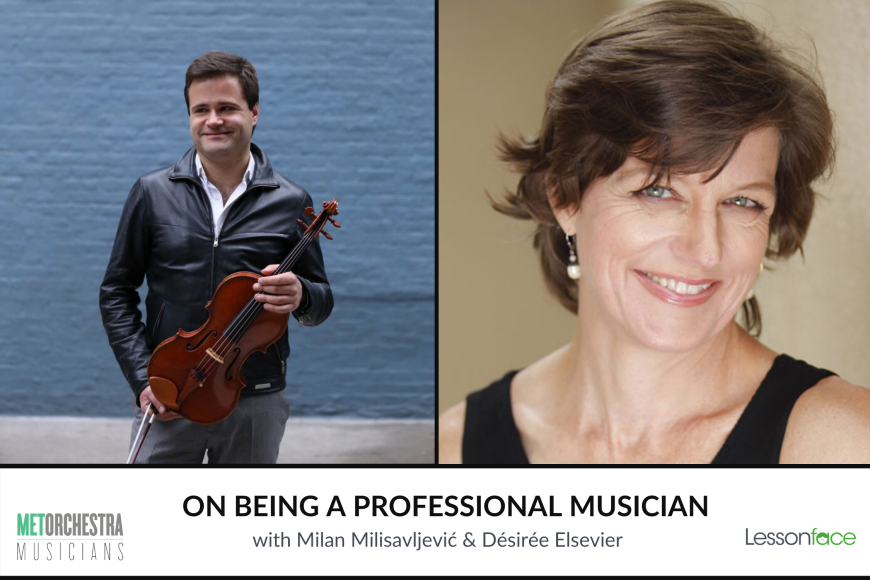Advice from MET Orchestra Violists Milan Milisavljević and Désirée Elsevier

ON BEING A PROFRESSIONAL MUSICIAN
What does it take to be a professional violist? We asked Principal Violist Milan Milisavljević and Désirée Elsevier, a member of the MET Orchestra since 1987, this question.
“If you want to be a musician you have to really want it. It requires a lot of hard work and a lot of concentration in ways that are entirely self-driven. No one is telling you to do it,”Désirée said. “You have to do it because you have to do it. It’s a tough ask in this economy.”
Certainly this is a time where musicians (and many more besides) are struggling in this world. So what can an aspiring musician do to set themself apart?
Milan relates, “It’s the small things that can be important; the process for achieving that level [becoming a professional musician] is not linear.”
Milan and Désirée both advise that working on becoming a well-rounded musician can certainly help. Just as an athlete does more than simply playing their sport, a musician needs to become well-rounded by honing in on things that may not immediately seem part of one’s craft.
“There is an incredible parallel between performing musicians and athletes,” shares Désirée. “In the same way a tennis player is going to do 2-3 hours a day of core work or other exercises seemingly unrelated to tennis, these small things are part of what make a great athlete. Music is also a performance sport.”
For musicians, becoming well-rounded may seem amorphous and harder to grasp. This is where self-evaluation is important. Finding role models makes this easier. Désirée recommends asking yourself, “What is it about that playing that I don’t have or that I want?”
Self-evaluation and self-direction are critical to advancing as a musician.
The life of a professional musician isn’t easy. It’s a hard world, a little bit of luck mixed with a whole lot of skill. But both Milan and Désirée agree there’s one more very important component that can’t be stressed enough.
TECHNIQUE SHOULD BE IN SERVICE TO MAKING MUSIC
“Music is a transcendent, metaphysical event. It’s visceral; it’s non-tangible.” Milan firmly believes that technique should be in service to your activity. “It should give you freedom. The hard part of making music is not always the technique, but rather feeling [the music] that is as important as anything else. It’s so much about finding and expressing the inner voice.”
Désirée concurred, “Often you can practice something and you get everything right, but you’re not making music. You’re going through the motions. You’re so panicked about getting that shift or that bow crossing that you forget that this is music. It’s a phrase. It’s something that communicates.”
And that brings us to our tips from these incredible violists.
Tips from Milan Milisavljević & Désirée Elsevier
— Trust in what you’ve absorbed, find your own inner voice, and believe in it.
— Focus on what’s important. What is it going to take to get you to the next level? Are you willing to put in that time and work?
— Remember what was said in each lesson. It’s very easy to forget week to week. Actively focus on what’s being said and implement that immediately in your next practice session.
— If you take the time to warm up your career will be longer, your joints will stay better, your neck will feel better; In the same way that if you take the time to work out, you’ll have a happier middle and older age. Ignoring warm ups won’t hurt you tomorrow, and it’s hard to act on something that doesn’t seem immediate. Do it anyway.
— Work on your technique as though everything is a concerto.
— Practice SLOWLY to make your technique flawless.
— Train your ears to work well. Don’t let your ears stop listening. It’s not just the metronome we don’t listen to; we don’t listen to our own intonation, we don't listen to our bow changes.
And lastly,
— Don’t get lazy. Hone your craft every day. Get into the habit of playing well every day for 20 minutes. Just 20 minutes of long notes where you listen to your vibrato, bow changes, and always actively listen to your pitch. Do this every single day.
If you’d like to hear more wisdom from these and other MET Orchestra Musicians or audition for an upcoming Master Classes, be sure to check out the upcoming and recorded MET Orchestra Musicians Master Classes.






Comments
Steve Brown
Fri, 02/19/2021 - 6:55am EST
Permalink
These people can be admired,
These people can be admired, thank you for your advice!